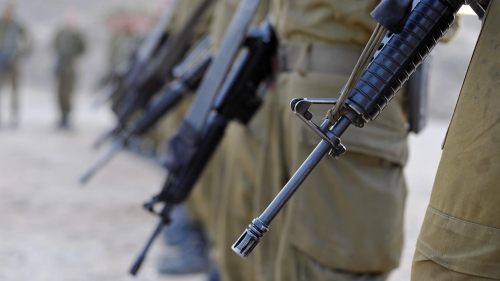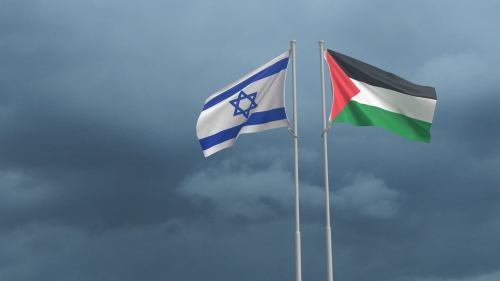Salaams from Jerusalem: Notes on a Visit to Palestine
Occupied Jerusalem, Dec. 28 (iviews.com)--As I awoke this morning to the sound of the adhan in Al Quds (Jerusalem), I was momentarily disoriented. Was I really in Palestine? Once I opened my eyes, I was amazed that I was up so early after only a few hours of sleep and an entire day of air travel. I wondered whether the muezzin's voice was coming from the Al-Aqsa mosque or a smaller one closer to my hotel on the Mount of Olives overlooking the majestic Old City of Jerusalem. As I peered out of my window, I also heard the tolling of a church bell nearby, interspersed with the occasional crowing of a rooster. Yes, indeed I was in Palestine--in the shadow of one of Islam's holiest sites and the first qibla toward which our Muslim predecessors prayed.
My flight to Palestine was rather uneventful. Whenever I travel here, I am apprehensive about the long flight. Who will sit next to me? Will it be someone pleasant, someone talkative, a hard-core Zionist, a fair-minded American, a Palestinian, a Muslim? For the first leg of my flight, my neighbor was a pleasant Indian-born Persian gentleman, a Zoroastrian, returning home to Toronto after a trip to India. When he learned that I was Palestinian, he peppered me with questions about the ongoing violence in the Holy Land. He was generally sympathetic to the plight of the Palestinian people, but he shared the cynicism of many people that "the conflict will never end". On the second, longer leg of my flight, a burly Israeli man, named Shalom, sat next to me. Usually, I eschew political talk with such individuals during my flights. However, this man was keenly interested in sharing with me his views on the current situation. More interested, it seemed, than in actually hearing the views of a Palestinian-American. Yet I listened patiently to his words, hoping to perhaps capture a glimpse of open-mindedness that is rare among Israelis--some sense of common ground.
Unfortunately, all I heard were the same tired arguments and claims that pro-Israeli apologists have been promoting since the onset of the Al-Aqsa intifada. Palestinians are sending their children to get killed for propaganda purposes, he told me. Their leaders have led them to have "false expectations" about the nature of a future Palestinian state. Palestinian claims regarding the "right of return" of the world's estimated 4 million Palestinian refugees are "unrealistic" and "impossible". And this preposterous claim: Israeli settlements are built on land "purchased" from Palestinians.
He was not swayed by my tale of my grandfather's land being illegally confiscated in the 1970s for the building of a West Bank settlement. Nor was he impressed when I pointed out the double standard of allowing over one million Soviet Jewish refugees to immigrate to Israel while refusing to allow Palestinians who were expelled or fled to return to their homes. To this man, Palestinians under Israeli occupation were not "ready" for democracy. Israeli Prime Minister Ehud Barak was the most "generous" Israeli leader ever likely to be encountered by the Palestinians, who were poised to "miss another opportunity". When he repeated the absurd Israeli claim that Palestinians--and not Israelis--had killed 12-year-old Muhammad al-Durra as he cowered behind his father for protection in a now infamous news videotape--I realized that this "mainstream" Israeli was merely another instrument of the Israeli propaganda system that seeks to dehumanize Palestinians. I spent the rest of the flight in relative silence, glancing frequently at my watch while counting away the hours.
I arrived in Palestine at approximately 6:00 PM. As I climbed down the stairs from the plane to the tarmac at Ben Gurion Airport in Tel Aviv, I wondered how long the standard Israeli interrogation of anyone with an Arab or Muslim surname would take? Before I even boarded the bus that would take us from the plane to the terminal, Israel's "racial profiling" policy was plainly evident. I was intercepted by an Israeli security agent, who demanded my passport and ticket. As he typed my name into a hand-held computer--the type used by Israeli soldiers at numerous military checkpoints throughout the occupied territories---he peppered me with questions. What is the purpose of your visit to Israel? Where were you born? Where do you live? What do you do for a living? Why did you come through Canada? Where will you be staying? Who is picking you up from the airport? I answered these questions patiently, while simultaneously noting that nobody else on the plane, mostly American Jews and Israelis, was "greeted" in a similar manner. After my bland responses to his questions failed to excite the security agent, he abruptly handed me my passport and ticket and said "okay", which I took to mean that I could board the bus to the terminal. Of course, there was no "sorry for the inconvenience" or "enjoy your visit". To the Israeli, I was just another potential "terrorist", simply because of my appearance.
At the terminal, I was again questioned in the same manner before having a tourist visa stamped on my US passport. In addition to the visa, the clerk stamped another piece of paper with the infamous "zero"--a code to the next security agent that further interrogation and search was warranted. My passport was then confiscated, and I was told to gather my luggage and return to the security station. Then, the interrogation continued. A young Israeli man asked me the same questions that I had encountered on the airport tarmac. In addition, he asked, "Why did you choose to come during this time of riots?" Funny, I thought. None of the other American passengers were asked this question, as far as I could determine. The security agent then informed me that in nearby Tel Aviv, just a few hours prior, a bomb had exploded. (I would later learn that several pipe bombs had exploded on a bus in Tel Aviv, and a roadside bomb was detonated near Gaza, killing two Israeli soldiers). Perhaps he thought that my arrival was intentionally timed to coincide with the bombing, part of some sinister international plot. In any event, my suitcase, hand luggage, and laptop computer were run through a x-ray machine. It didn't seem to matter to the Israelis that my luggage had just arrived via two long flights and that my hand luggage had been evaluated by security both in Los Angeles and Toronto. If there was anything "suspicious" in my baggage, it should have been picked up by security long ago. Remarkably, I was then asked to walk through a metal detector--again, after disembarking from the plane just a few minutes earlier. Meanwhile, almost all of the other passengers on my plane had retrieved their luggage, passed through customs, and departed the airport. Only a young Arab woman being interrogated by another Israeli agent shared my isolated corner of the airport terminal. Having successfully jumped through all the Israeli security hoops, my passport and ticket were returned to my possession, and I was finally allowed to leave the airport.
I probably should have been angrier that I was once again subjected to the blatantly discriminatory Israeli "racial profiling" policy. But at this point, I was simply tired from the long trip. Anyway, I thought, my inconvenience paled in comparison to the daily humiliation faced by Palestinians at the hands of their Israeli occupiers--a reality I will undoubtedly witness in the coming days.
__________________________
Dr. Riad Abdelkarim is a physician and writes for the Washington Report on Middle East Affairs. He is currently visiting the Occupied Territories and plans to share his experiences in a series of reports for iviews.com.

















